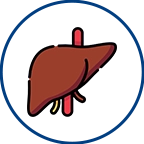MRI Left Knee Joint
Magnetic Resonance Imaging (MRI) of the Left Knee Joint is a non-invasive and highly ...
5000+ scans done & counting.
Offer Price @
₹ 8400/-
Book TestMagnetic Resonance Imaging (MRI) of the Left Knee Joint is a non-invasive and highly detailed imaging technique used to examine the structures within the knee. It uses a powerful magnetic field, radio waves, and a computer to produce images of both the bone and soft tissue components of the knee. This diagnostic procedure helps in evaluating various conditions such as injuries to the knee joint, infections, arthritis, and other disorders.The knee is a complex joint that plays a vital role in movements such as walking, running, sitting and standing. It is made up of bones, cartilage, ligaments, and tendons. Because of its complexity and the stress it endures through everyday movements, it is prone to various injuries and conditions.
MRI of the Left Knee Joint is considered one of the most reliable imaging techniques for assessing the structures of the knee. It offers clear and detailed images which are highly beneficial in diagnosing and treating knee problems, especially those involving soft tissues such as ligaments and tendons.
Specific Instructions:
Metal Objects: Patients need to inform the medical staff if they have any metal implants, pacemakers, or other metallic components in their bodies. Jewelry and other metal objects should be removed.
Clothing: Comfortable and loose-fitting clothing is recommended. In some cases, the patient may be asked to wear a gown.
Claustrophobia: Patients with claustrophobia should inform the staff, as the MRI machine is an enclosed space. Medication to relax might be provided.
Allergies: If contrast material is to be used, inform the staff of any allergies, especially to iodine or shellfish.
Pregnancy: Inform the staff if there is a possibility of pregnancy.
What is the process of getting an MRI of the Left Knee Joint?
Upon arriving at the MRI center, the patient will be asked to change into a hospital gown and remove all metal objects. The patient will then lie on an examination table. The left knee will be placed in a coil, which is a device that helps improve the quality of the images. The examination table will slide into the MRI machine which is tube-shaped. During the scan, the patient will hear loud noises, but will not feel any pain or discomfort. The procedure usually lasts about 30 to 60 minutes.
What is the importance of getting this test done?
MRI of the Left Knee Joint is essential in assessing the knee for injuries and other conditions which can cause pain or dysfunction. It can be used to detect torn ligaments, torn cartilage, bone fractures and the presence of any underlying disease such as arthritis. It's particularly useful in cases where the X-rays are normal but the patient continues to have pain.
Pain or swelling in the knee
Sports-related injuries
Degenerative joint disorders such as arthritis
Infections
Tumors
Unexplained pain or bleeding in the joints
What information does an MRI of the Left Knee Joint provide?
An MRI can show detailed images of the bones, cartilage, tendons, and ligaments in the knee. This information is crucial for diagnosing injuries, infections, and other abnormalities.
How often should this test be done?
The test should be done as recommended by the doctor, usually when there are symptoms that need investigation or monitoring of an existing knee condition.
Which doctor should be consulted in case of abnormal findings?
In the case of abnormal findings, it is best to consult an orthopedic surgeon or a rheumatologist, depending on the nature of the condition.
Modifiable factors: Recent injury, medication, or surgery.
Non-modifiable factors: Congenital knee conditions, age, family history of knee problems.
Home Sample Collection
Is MRI safe?
Yes, MRI is generally safe as it does not use ionizing radiation. However, the magnetic fields can affect pacemakers and other implants.
What should I bring with me for my MRI?
Bring your referral, any previous imaging, and a list of current medications. Leave jewelry and unnecessary metal objects at home.
How long does the MRI take?
An MRI of the knee typically takes around 30 to 60 minutes.
Is there anything I need to do after the MRI?
There is typically no special type of care required after an MRI scan. You can resume your usual diet and activities unless your doctor advises you differently.
Why might I need an MRI of my knee instead of an X-ray or CT scan?
MRI is particularly good at imaging soft tissues, such as the ligaments and cartilage of the knee, which are not clearly visible on X-ray.
What is the difference between an MRI with contrast and without contrast?
Contrast is a special dye used to make certain tissues more visible. An MRI with contrast may be used to help see blood vessels, inflammation, or tumors.
What should I do if I have metal implants or a pacemaker?
You must inform the medical staff as MRI usually isn’t recommended for those with certain metal implants or pacemakers.
Will my insurance cover the MRI?
Coverage varies among insurance companies. It’s best to consult with your insurance provider prior to scheduling the MRI.
Can I listen to music during the MRI?
Some MRI centers allow patients to listen to music during the scan to help relax.
Can I move during the MRI?
It’s essential to remain very still during the MRI to ensure the images are clear.
MRI of the Left Knee Joint is a vital imaging tool in diagnosing and managing various knee conditions. This safe and painless procedure can provide detailed images that are critical for treatment planning. It is crucial to follow the specific instructions provided and communicate openly with the medical staff to ensure the process goes smoothly.
Book Your Slot
Our Locations Near You in Hyderabad
3KM from Banjara Hills
1.9KM from Yusufguda
3KM from Madhura Nagar
5KM from Shaikpet





